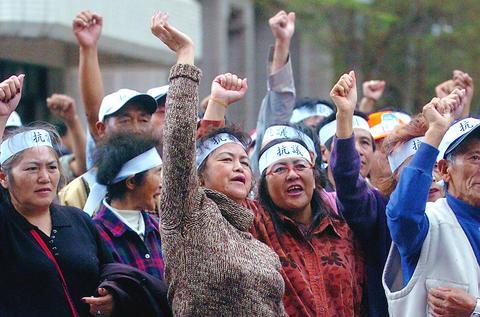Threatening with "extreme measures" should the Executive Yuan fail to heed their demands, over 1,500 Aborigines gathered in front of the Legislative Yuan yesterday to protest a draft bill that would halt the repair and construction of roads in mountainous areas.
A tense atmosphere hung over the protest throughout the afternoon, with protesters getting increasingly agitated, despite protest organizers' pleas for calm.

PHOTO: SEAN CHAO, TAIPEI TIMES
Several protesters scuffled with police around 3pm when they were prevented from marching to the Executive Yuan. One policeman was injured in the scuffle.
Nantou County councilor Hsieh Wang-shan (
Led by Aboriginal lawmakers Hsieh, May Chin (
Yelling slogans such as "Premier Yu Shyi-kun, come out" and "[Council of Indigenous Peoples] Chairman Chen Chien-nien [陳建年], come out," the Aboriginals marched toward the Executive Yuan around noon yesterday, demanding that the Executive Yuan send out a high-ranking representative to sign a written agreement to reconsider the bill.
Although the protesters originally planned to camp out in front of the Executive Yuan, they were forced to camp in front of the Legislative Yuan's Chi-nan Road entrance, because the organizers had only been able to get a permit to gather at the legislature.
Yesterday's rally was a continuation of the Aboriginal lawmakers' protest against a draft bill on land restoration and conservation (國土復育特別條例). The Council for Economic Planning and Development's (CEPD) special bill aims to ban land development, road construction or repair, farming and residence in certain areas in view of the destruction caused by this summer's natural disasters.
Dubbed the "genocide bill" by Chin when she led a similar protest to the Executive Yuan on Oct. 19 with Walis, the bill's provision banning construction and repair of roads in areas with fewer than 30 households cut off lifelines for many Aboriginal villages, Chin said yesterday.
"Just because a village has less than 30 households does not mean that its residents are not people," said Chin yesterday to protesters outside the Legislative Yuan.
While CEPD chairman Hu Sheng-cheng (胡勝正) promised protesters that the CEPD would consider Aboriginal concerns in the bill's construction at the Oct. 19 protest, organizers said that they decided to march yesterday because they were running out of time.
"Harvesting time is coming for a lot of these villages affected by the bill. We need to have the roads repaired now," Lushan said yesterday, adding that the Executive Yuan has in effect already promulgated the draft bill by delaying reconstruction of roads identified by the bill.

‘DENIAL DEFENSE’: The US would increase its military presence with uncrewed ships, and submarines, while boosting defense in the Indo-Pacific, a Pete Hegseth memo said The US is reorienting its military strategy to focus primarily on deterring a potential Chinese invasion of Taiwan, a memo signed by US Secretary of Defense Pete Hegseth showed. The memo also called on Taiwan to increase its defense spending. The document, known as the “Interim National Defense Strategic Guidance,” was distributed this month and detailed the national defense plans of US President Donald Trump’s administration, an article in the Washington Post said on Saturday. It outlines how the US can prepare for a potential war with China and defend itself from threats in the “near abroad,” including Greenland and the Panama

A wild live dugong was found in Taiwan for the first time in 88 years, after it was accidentally caught by a fisher’s net on Tuesday in Yilan County’s Fenniaolin (粉鳥林). This is the first sighting of the species in Taiwan since 1937, having already been considered “extinct” in the country and considered as “vulnerable” by the International Union for Conservation of Nature. A fisher surnamed Chen (陳) went to Fenniaolin to collect the fish in his netting, but instead caught a 3m long, 500kg dugong. The fisher released the animal back into the wild, not realizing it was an endangered species at

The High Prosecutors’ Office yesterday withdrew an appeal against the acquittal of a former bank manager 22 years after his death, marking Taiwan’s first instance of prosecutors rendering posthumous justice to a wrongfully convicted defendant. Chu Ching-en (諸慶恩) — formerly a manager at the Taipei branch of BNP Paribas — was in 1999 accused by Weng Mao-chung (翁茂鍾), then-president of Chia Her Industrial Co, of forging a request for a fixed deposit of US$10 million by I-Hwa Industrial Co, a subsidiary of Chia Her, which was used as collateral. Chu was ruled not guilty in the first trial, but was found guilty

DEADLOCK: As the commission is unable to forum a quorum to review license renewal applications, the channel operators are not at fault and can air past their license date The National Communications Commission (NCC) yesterday said that the Public Television Service (PTS) and 36 other television and radio broadcasters could continue airing, despite the commission’s inability to meet a quorum to review their license renewal applications. The licenses of PTS and the other channels are set to expire between this month and June. The National Communications Commission Organization Act (國家通訊傳播委員會組織法) stipulates that the commission must meet the mandated quorum of four to hold a valid meeting. The seven-member commission currently has only three commissioners. “We have informed the channel operators of the progress we have made in reviewing their license renewal applications, and